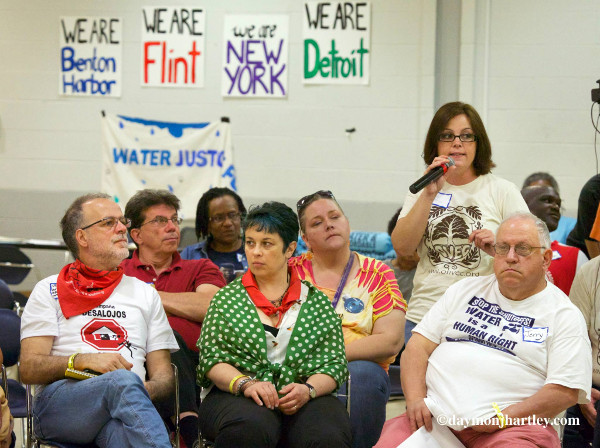
PHOTO/DAYMONJHARTLEY.COM
Editor’s note: The People’s Tribune interviewed Paula Swearengin, part of the Direct Action Welfare Group and the Ohio Valley Environmental Coalition in West Virginia.
“I come from a long line of coalminers. My grandfather died of black lung. My dad died of cancer and black lung. My stepfather died of heart disease and black lung. My uncle died of black lung. Here in West Virginia we have a singular industry based economy. Most of our economic value depends on this one industry.
“In the little coal towns where we grew up, everybody’s water was filthy dirty with manganese and other toxic coal industry chemicals. I was sick all the time. Back in the ‘80s my step-dad got laid off from the coalmines and my family had to move to North Carolina to make a living. I remember thinking how clean and beautiful it was. I didn’t have to breathe the coal dust and we had water that was clean and fresh, not dirty. The water that came out of the faucet in West Virginia was thick and orange, full of chemicals. My mother gave us a bath and it had purple film on top. My hair was orange when I moved. Half of my little brother’s graduation class had lost their teeth. A lot of people had mental diseases, come to find out it was the water. This is what happens here. Nobody puts value on us. It’s like living in a sacrifice zone. They say, ‘Let the poor die, lets go ahead and dig that coal.’
“After the unions came into West Virginia, we said ‘we have value, we’re human beings, we don’t want to live like this anymore.’ But back in the 80s they busted the unions. They brought in non-union coal companies that the miners called scab mines. They dangled a carrot in front of people’s noses. People got maybe $15 an hour, nicer houses and vehicles. Then came another bust and they were living on welfare again.
“The leadership here doesn’t really support us. We have the best-paid politicians the coal industry can buy. They own us. It’s like the mafia.
“Today, coalminers are worrying about putting food on their table, and the water is still toxic. They’re saying, ‘You’re poisoning my child.’ But we’re divided in this state. There needs to be an awakening, but our government and the coal industry pit us against each other. I want to organize an environmental event in Washington, DC, for humanity with our allies in other cities. It seems like the government is taking everyone’s basic needs; if not water, then basic utilities. It’s going to take national collaboration. I went to the water gathering in Detroit [where thousands have been cut off water] to find some solidarity. I want to let everyone know that, white, Black, any nationality, when you are poor, you’re ready to unite against injustice, and the poor from Appalachia are willing to stand with any community to make it better.”
“It’s going to take national collaboration,” says fighter from West Virginia
Latest
Free to republish but please credit the People's Tribune. Visit us at www.peoplestribune.org, email peoplestribune@gmail.com
The People’s Tribune brings you articles written by individuals or organizations, along with our own reporting. Bylined articles reflect the views of the authors. Unsigned articles reflect the views of the editorial board. Please credit the source when sharing: ©2024 peoplestribune.org. Please donate to help us keep bringing you voices of the movement. Click here. We’re all volunteer, no paid staff.


Paula Swearengin is right. The people of West Virginia have seen our loved ones die from the dirty business of coal. It has touched everyone’s life here in the mountain state and not in a good way. It’s not just here in West Virginia though. It’s everywhere. Fracking causes toxic water, coal mining causes toxic water, oil drilling causes toxic water. Our country is a wasteland and our leaders do not care. Our leaders have lost their focus on what their own value is to our Nation. If this is the best you can do all for the love of money then resign and let our people run this country. We might have to go backward a step or two to rebuild our Nation, however it will be worth it instead of the alternative. We are heading down a dark and lonely path of destruction where nothing will survive. While we are on the subject of survival – stop the chemtrails. People are getting sick. Stop with the lies and deceit on this Nation. Stop with the gun control and threats to us. Don’t make us come into your house and remove you. Stand up for what is right or don’t stand at all. When humans no longer value life itself they put the universe at risk of extinction….and that includes each and everyone of you. – Much love compassion and respect for our world is necessary for a rich and vibrant life that all deserve.